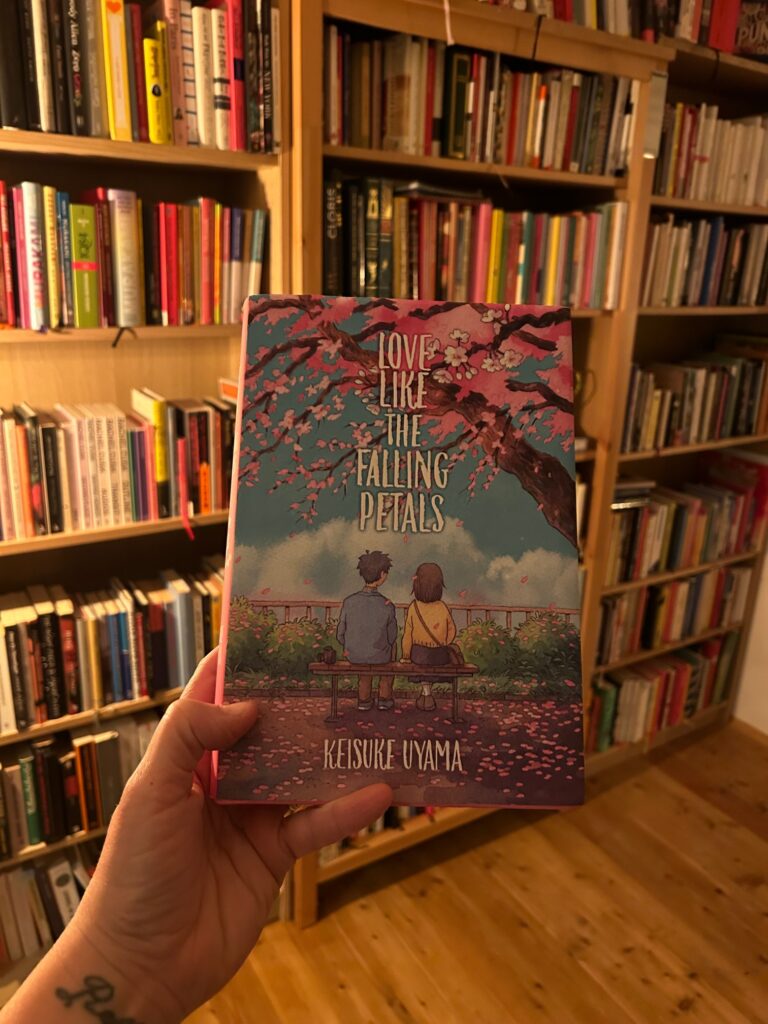
I love Japanese authors and their style of writing. Many stories are unique in that they utilize magical realism, a style of writing that combines mystical elements with real-life experiences. Usually, there is a mix of fantasy and reality, which Japanese authors use to explore themes like loneliness and self-discovery interestingly and imaginatively. But not in Love Like the Falling Petals.
What this book is about:
A photographer, Haruto, meets kind hairdresser Misaki. Misaki reveals that he was her very first client, which he finds endearing, and he falls in love with her at first sight. Haruto bends the truth and introduces himself as a photographer.
Haruto continues to return to get his hair cut by her, and the two become close. One day, Haruto decides to ask Misaki on a date, bringing up the topic while getting his hair cut. Incidentally, he moves his head and causes Misaki to cut the tip of his earlobe, making him bleed profusely and pass out.
A few days later, a frantic Misaki meets with Haruto to apologize for the injury. He brings up the question of a date, to which she agrees. Misaki’s protective older brother does not approve, however, as he only wants what is best for her.
They go on a date to see cherry blossoms, where Haruto reveals that he is not currently a photographer and is at a crossroads. Misaki becomes furious that he stopped pursuing his dream and advises Haruto not to give up so easily just because things get hard. They start to date more seriously.
Their happy romance comes to a halt, as Misaki falls ill, leading to a doctor’s visit where she is diagnosed with progeroid syndrome: a disease that ages her extremely fast, deteriorating her body at an alarming rate. Misaki’s case is extreme, leaving her with less than a year to endure the debilitating symptoms.
Misaki, devastated, goes into seclusion and cuts Haruto off. Although heartbroken, Haruto tries to move on from Misaki. He concentrates on his photography and bears the fruits of his efforts, which helps in his journey of healing but he never forgets her and loves her still. Misaki ages rapidly but contacts Haruto again because she loves and cannot forget him….
Why I loved the book:
I love love. In this book, the ephemeral nature of love and life is depicted through the motif of cherry blossoms, which Japanese people cherish as a metaphor for life. Cherry blossoms only bloom for a short period every year. Throughout the story, I hope readers, regardless of their culture or nationality, can experience the sentiment that life is as beautiful and transitory as the falling cherry blossoms.
I was touched by the way the author, Uyama, depicts the varying forms of love. In addition to being a beautiful depiction of a budding relationship between young adults, the story illustrates the themes of familial love, grief and loss in a sincere way.
Love Like the Falling Petals is a heart-wrenching tale that will take you on an emotional journey and paints a vivid picture of the country’s culture and traditions while exploring the universal themes of love, sacrifice, and the power of the human spirit.
Written with raw emotion and masterful storytelling, Love Like the Falling Petals is a must-read for anyone who has ever fallen in love. Don’t miss out on this moving and unforgettable story! Also, the book has been made into a movie if you would like to watch.